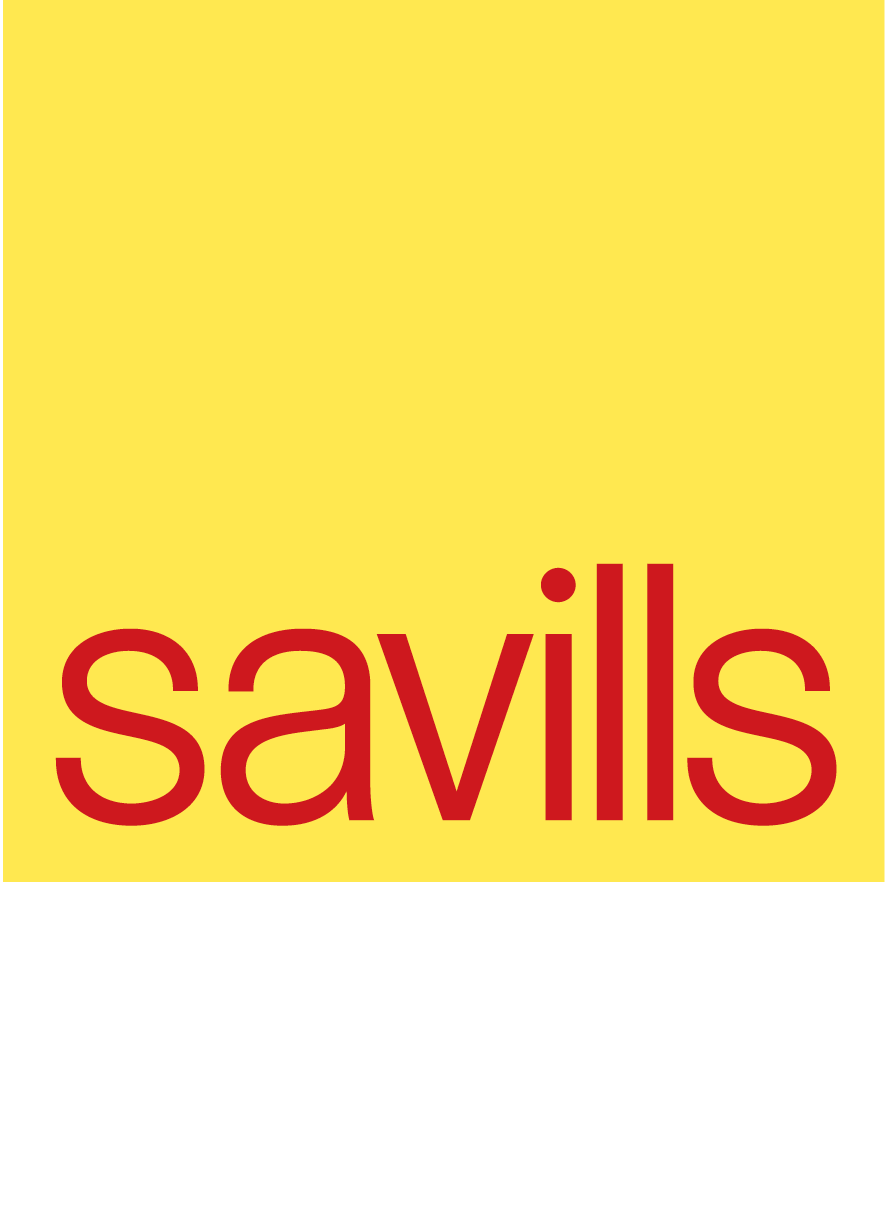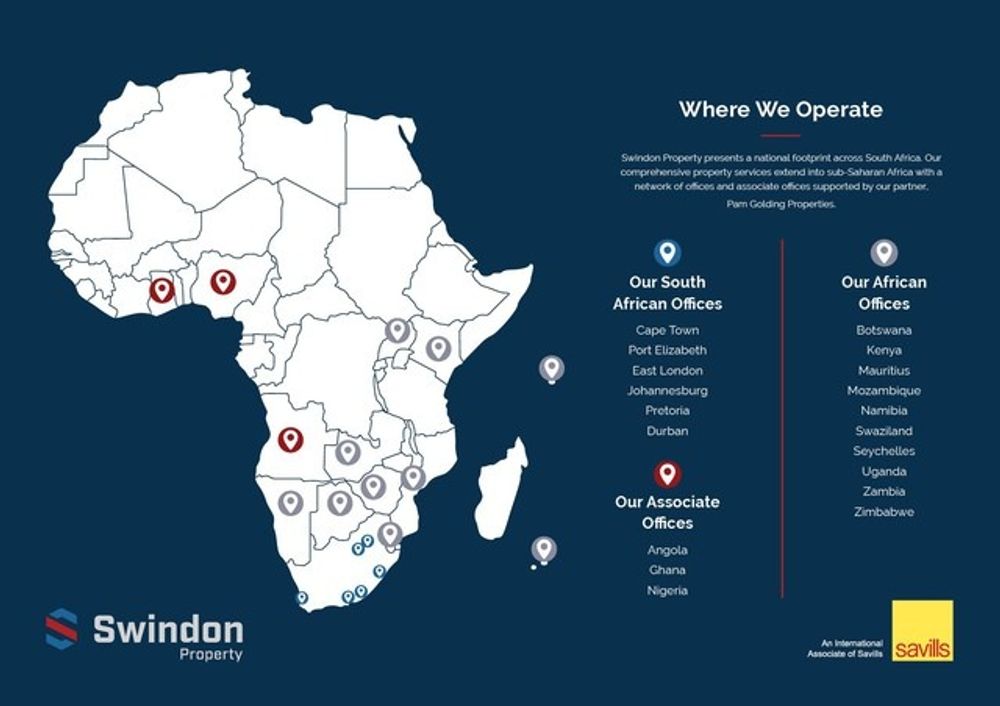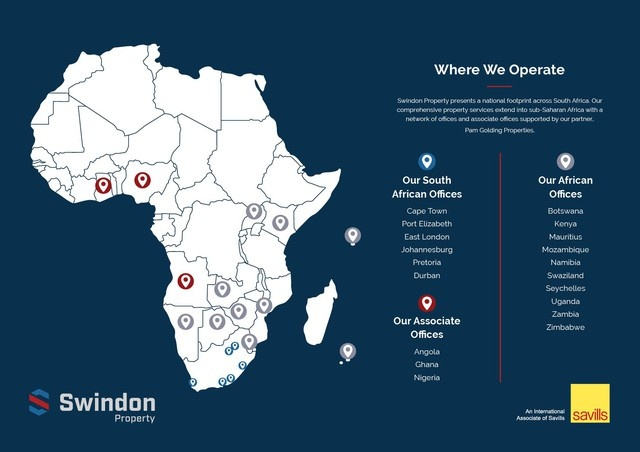Almost no commercial property sector in the world has been unaffected by the pandemic, with many African cities struggling with high vacancy rates. Yet despite this there are positive signs of a rebound.
This is according to Swindon Property's first edition of their African Cities Insights for Q2, 2021. The report shares local insights, trends, and investment opportunities in the sub-Saharan African markets they operate in. This report includes five regions namely Lagos, Nigeria; Nairobi, Kenya; Accra, Ghana; Luanda, Angola and Windhoek, Namibia. Client advisory for Swindon Property sub-Saharan Africa, Geoff Kruger, reveals that since operations in these markets began just over a year ago, they've noted much of the same trends taking place across the continent.
With far fewer international clients entering the office market the report suggests that most of the leasing activity is coming from space reductions by existing tenants. Landlords are more willing to grant extended rent-free periods of up to six months and beyond, rather than offer prospective tenants a fit-out allowance, which has become high in demand versus the shell and core option due to budget restraints.
"We've noted that larger companies using the hybrid approach have relinquished on average between 2000 - 5000 square metres of their office space putting much pressure on landlords. Yet, interestingly against the trend is an 8000 square meter office expansion in Lagos, Nigeria, which we negotiated and concluded for Microsoft, highlighting the demand for good quality, flexible office space in the region. But across the board office rental rates have decreased," says Kruger.
Prime office rental rates for A+ grade office space in the most affluent area of Lagos, Ikoyi, has dropped by about 20% from USD 780 per square meter in 2017 to USD 630 per square meter in 2021. In Nairobi, prime commercial office rents, USD 11 - USD 12 per square metre per month have also decreased, from USD 13 per square meter per month in the second half of 2020 yet holding steady for Grade A office stock. The Accra Office market in Ghana is readjusting itself to perhaps more affordable levels since the 1st quarter of 2020 when the pandemic struck. Here prime rentals have dropped from USD 35 - USD 40 square meter per month exclusive of service charges to a more competitive average of USD 25 - USD 30 per square meter per month exclusive of service charges. Here landlords are prepared to offer generous incentives such as three to six months' rent-free periods as well as other tenant incentives.
Swindon partnered with international real estate advisor, Savills in 2020 becoming their commercial associate for sub-Saharan Africa firmly establishing themselves as the fastest growing commercial real estate agency in Africa. Through this association Swindon also works closely across the continent with Savills' long-standing residential associate, Pam Golding Properties. Their network thus far therefore includes all Pam Golding Properties offices located in nine countries outside of South Africa including Botswana, Namibia, Mozambique, Seychelles, Zimbabwe, Zambia, Uganda, Kenya, and Mauritius.
"We also recently signed up an associate office in Nigeria and we are in discussions with potential associates in Angola, Ghana, and the Ivory Coast, so we have a good grasp of what is happening across the continent," continues Kruger.
In terms of the industrial sector the report indicates a bigger demand for warehousing space, even though there is less demand for retail space possibly due to an increase in online shopping. The biggest trend by far can be seen at shopping malls. Most retail outlets have reduced their floorspaces and while less people are visiting malls, there is a notable increase in strip malls, especially in Nairobi, Kenya as it seems to offer easier access with less security checks. Retail space in Nairobi's malls range from USD 18 - USD 23 square meter per month. Big retailers like Shoprite have exited Nigeria opening the door for Pick 'n Pay, South Africa's second largest retailer by market cap, to make its long-anticipated entry into the country.
In Ghana the average rent at Accra Mall is currently around USD 55 per square meter per month, a little higher than other malls in the city at USD 37 per square meter per month. Overall, Ghana's economy has remained relatively stable from a demand perspective with good growth in areas of distribution, manufacturing, and data centres.
Sadly, Angola's economy continues to struggle and has been very slow to respond to the pandemic recording a fourth year of recession. Here office rent has decreased dramatically over the last five years as multinationals continue to leave or decrease their space requirements dropping from USD 150 per square meter at the beginning of the last decade. Energy companies who have always paid the highest rents are now refusing to pay even USD 100 per square meter per month. Despite this there is hope that the retail sector in Angola can drive economic growth in the next quarter. It has always had some significant singularities in the local market and it potential is good especially with the shortage of supply being slowly addressed. Here retail rentals can range from USD 20 - 90 per square meter depending on quality and location.
Windhoek is Namibia's largest city and the four years of economic recession prior to the pandemic has had a huge impact on its real estate market which has contracted about 50% over the last six years. It will take real growth in the local economy for it to recover. To make matters worse is that local commercial banks are reluctant to finance new transactions. Besides low cost and affordable housing schemes there are currently no new residential, office, retail, or industrial development in progress. There is a slight over supply with both Standard Bank and Nedbank moving out of rental properties and into their own newly developed head offices. Average rental rates range from USD 11 per square meter for A grade offices down to USD 8,50 per square meter depending on the property. Where there are opportunities for future commercial development is in the expansion and development of the Walvis Bay harbour.
"As mass vaccination programmes roll out and pandemic restrictions begin to ease, we should see investor confidence returning to the sub-Saharan Africa region bringing with it an increase in rental enquiries in all property sectors. The oversupply of B grade offices opens many opportunities for tenants to get the properties they desire at a competitive price," concludes Kruger.
For full report or more information on Sub-Saharan Africa please contact geoff@swindon.co.za.
ENDS
Acknowledgements
Geoff Kruger - Nigeria
Paul Kruger - PGP Namibia
Nuno Serrenho (Associate) Angola
William Bobie (Associate) Ghana
Nafisa Teja - PGP Kenya



